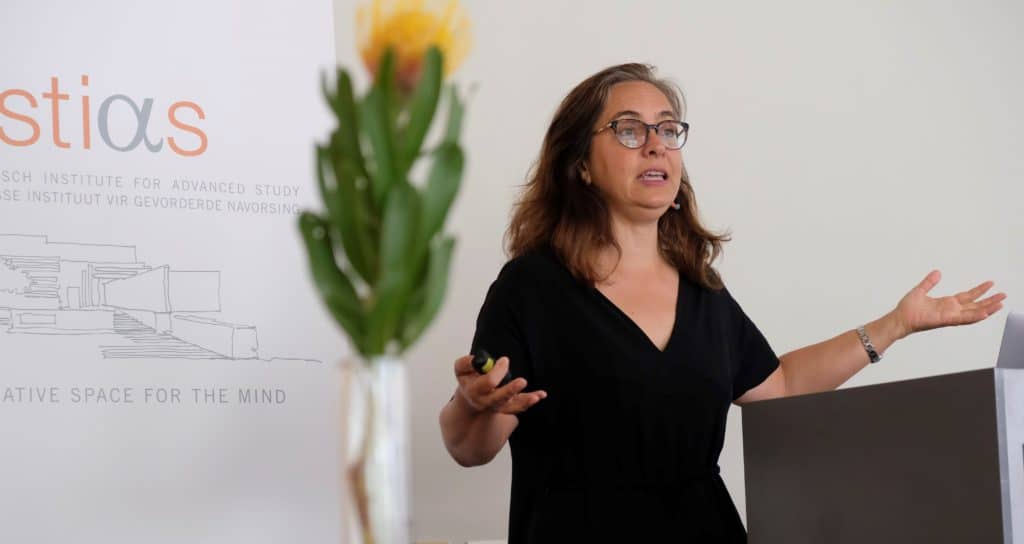“My hypothesis is that living under injustice does systematic damage to our capacity to be whole, unified persons and that it predicts moralised self-deception and widespread delusional ideology,” said Lucy Allais of the Department of Philosophy, University of the Witwatersrand and University of California.
Allais presented an overview of her book project which will unpack a philosophical account of the concept of human freedom drawing strongly on German philosopher Immanuel Kant. Allais described herself as having spent a lot of her career on Kant.

“This is, in part, a historical project drawing on Kant,” she continued. “Philosophy is a strange, non-empirical subject. The history of philosophy is a live part of philosophy. We don’t discriminate against philosophers because they are dead. Many of them deal with problems we don’t yet know how to solve. I want to take Kant’s ideas and develop or reconstruct them.”
The book will contain three sections.
“The first part will cover the metaphysics of free will,” explained Allais. “how to reconcile the way we think about causation in science, in particular in causal laws, with our having the kind of freedom that is required to be morally responsible, and to be able to make choices that are not causally determined.”
She described reconciling our ideas of free will with the more deterministic laws of science as an ‘old problem’.
“If humans are made of matter, which is governed by deterministic laws, is choice just an illusion?,” she asked. “Do we have freedom in relation to God’s knowledge, biological determinism, social and historical determinism?”
“And what about randomness – how do we deal with that? Randomness is not the same as choosing and quantum randomness isn’t found at the places we would need it to (for it to help with explaining free will); it does not occur at the point when we are making choices.”
She explained that Kant holds the laws of nature as deterministic but not as a closed system. “Intervention in the system is possible as there is not a total system of laws that determines what happens.”
In the second part of the book she will give a theoretical account of what it is to act autonomously, and the way this relates to our understanding of ourselves as being able to act in ways for which we are morally responsible.
“Kant looks at this as our capacity to respond to reason and to respond to the possibility of reasoning and acting with others.”
Justice as freedom
“The final part of the book is partly on a conception of justice as freedom and partly on the moral psychology of freedom,” said Allais. “The connection between these two is through thinking about how our moral agency is affected by living under unjust (unfree) conditions.”
“My interest is in thinking about human agency through looking at the ways it goes wrong.”
Part of this will involve developing Kant’s account of political freedom which highlights justice as freedom. “Kant wrote about this at the end of his life,” she explained. “It was very abstract and not much attention has been paid to it.”
She will also draw on the work of US social and political philosopher Charles Mills who focuses on non-ideal political theory centred on class, gender and race.
“Ideal theory approaches start by asking what an ideal state looks like and what a political philosophy based on freedom and justice looks like. Non-ideal theory starts by looking at injustice. Mills argues that the focus on the ideal is harmful if it leads to our failing to theorise injustice and if it leads to our idealising our actual societies and histories, over-estimating how just we are.”
“We then tend to think of a society as more just than it is,” she continued. “Mills argues that through this we actually perpetuate racial domination and that we need to rethink the liberal tradition, in particular, how liberalism should respond to past and present injustices.”
“We have to investigate the history of liberal political thought,” she said. “What is liberalism – it’s used in very different ways. In the US it implies wildly left-wing, in South Africa right-wing and in the UK centrist. Also we should be careful of the claim that liberal values such as human rights are essentially Western – the West has only very recently in our history shown any interest in human rights. These are not Western values. We should not assume that the West has any claim on those ideas. It’s wrongful idealising.”
“We need to rethink liberalism,” she added. “We should not be too sure that we know what the system implies.”
Turning to property, land rights and free markets which have always been seen as part of individual political autonomy, Allais pointed out that these are never closed systems and individual actions always affect resources over which we have no rights like public spaces and air pollution.
“Perfect competition does not exist,” she said. “A competitive market theory describes ideal conditions that are never actually met. Again this means we tend to idealise the actual conditions and don’t theorise the non-ideal.”
Allais indicated that her research will explore how our autonomous moral agency is affected by living under such unjust, unfree conditions. “Basically the effect on individual agency of living in a situation of injustice.”
“The problem is structural,” she said. “We exist under conditions of systematic injustice which we can’t fix individually. This does systematic damage to our capacity to be whole, unified persons. We have a human need to see ourselves as good. When we act against morality we have a need to make it seem like what we did was right. Deception and corruption are therefore pervasive, systematic features of human agents.”
“Rightful freedom requires certain kinds of institutional, social and community practices. Moral growth may requires cultivating some degree of constructive dissonance. We need to investigate this further and see where it gets us.”
Michelle Galloway: Part-time media officer at STIAS
Photograph: Noloysio Mtembu
